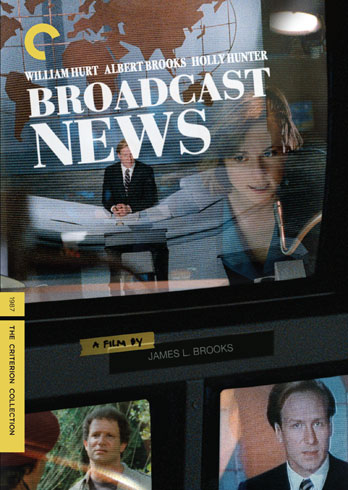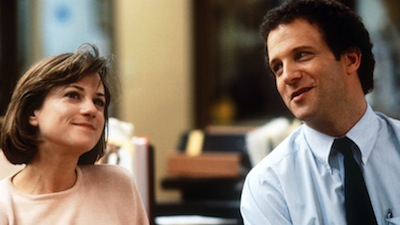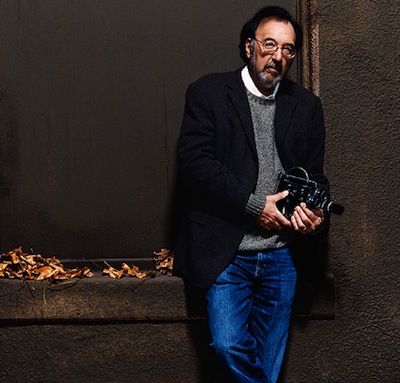"No. It's awful."

Man, I know I liked Broadcast News when I saw it at age 15, because the exchange between the unstoppable news producer Jane Craig and her boss quoted above has always stuck with me, but thinking about it now, I know I didn't really get it. In fact, even that, my favorite quote, is one I totally misremembered. In my brain, Jane nods, agrees with her boss, and silently says, "Damn straight it's nice." It's how I reacted when my father told me similar things many times in my late teens. Here I was basing my whole philosophy on a quote I didn't have right from a movie possessing complexities far beyond me. I did have a crush on Holly Hunter, who played Jane, I know that--but geez, that just seems trivial.
Broadcast News was released in 1987, four years after writer/director James L. Brooks had transitioned from the little screen to the big one with his cinema debut, Terms of Endearment
The literal changing face is played by William Hurt. His character is Tom Grunick, a sports reporter upgraded to neophyte newsman at the Washington bureau where Jane is a segment producer. She regularly works with Aaron Altman (Albert Brooks), a fiercely intelligent reporter who isn't afraid to dig deep into the story. They have a special rapport and shared ideals: the integrity of the news is sacrosanct, never to be breached. Empty personalities reading off a teleprompter should not be valued over smart journalists who write their own copy, and fluff pieces that make people happy shouldn't come at the expense of telling the audience what's really happening in the world. The chemistry between Jane and Aaron is obvious, but naturally, like the audience and the network executives, Jane is more drawn to Tom's pretty face. She begins guiding him through his early work, culminating in an unplanned Sunday anchor slot when Libya attacks a U.S. base in Sicily. It's a marvelous scene, moving back and forth between the news desk and the control room, with Jane whispering facts--some supplied by Aaron via telephone--into Tom's ear, directing him where he should go.
The exhilaration the pair feel following the live high-wire act pretty much seals the deal between them. It's a euphoria comparable to sex, which Tom says outright. Jane was in his head, lighting up his intellectual pleasure centers, reversing traditional gender roles, filling him with everything she had to give. It was, quite literally, a mindfuck. The only problem is that Jane essentially sees Tom as brainless, and there are questions of how much she respects the eager go-getter. When Aaron admits his own feelings, both the love he has for her and his disdain for his rival, it poses quite a puzzle, one Jane has a hard time solving.

It's a traditional romantic comedy formula, and make no mistake, Broadcast News is a romantic comedy. It's one of the first things that struck me about the movie seeing it again after all these years. We're not very far into the narrative when Jane and her crew, under tremendous deadline pressure, push a story up to its very last minute, forcing Joan Cusack, playing one of Jane's support staff, to run from the editing bay to the broadcast room, dodging filing cabinets and jumping over babies. It's expertly choreographed slapstick. Broadcast News is off and running.
One could say this is James L. Brooks' true gift: balancing a very traditional sense of comedy with incisive commentary on human emotion. The first three scenes of Broadcast News are introductions to the three principle characters as schoolkids. It's sort of a hokey, Rob Reiner-ish device, exaggerating their foibles for quick guffaws--or so it seems. At different times later in the movie, all three of those scenes will be replayed. No commentary is offered, and the repetition isn't exact, but we see the behavior again--Tom's self-chastising and determination, Aaron's superiority and pushing too hard to get the last word, Jane's jumpiness and compulsions. These are people who let themselves be defined by their faults because they mistake them for virtue.
The romantic set-up is quite meaningful. Whom Jane chooses is akin to the direction television journalism will also take. Do we stick with safe, nice, and easy to look at, or do we go with unvarnished and true? In a lesser romantic comedy, the choice would be obvious, but Brooks isn't going to let his characters off the hook that easily. If this were Pretty in Pink [review], sure, we'd all be rooting for Ducky, but Broadcast News is set in an adult world where the bloom of romance has drooped a little. (And that's not a knock at Pretty in Pink, bless its teenaged soul.) Brooks is in choppy waters. Reconciling the heart and the head requires compromise, but all points on this love triangle are too rigid when it comes to their own particular angles. They are too strident in their ideals to change course for anyone else.
Surprisingly, it's Tom that gets closest to making room for someone else. I definitely wouldn't have known that as a younger moviegoer. He'd have been the villain, no question. Now, not so much. In fact, Jane and Aaron are both the kind of nerds that grow up to be bullies. Off the playground, when it's no longer viable to beat your opponent to a pulp with your fists, the nerds get their revenge by doing it with their brains. Tom is the most genuine, he accepts his weaknesses and tries to build from there. William Hurt gets the well-intentioned lunkhead to a tee, giving him an insatiable yet befuddled curiosity, seemingly borrowing Tom's body language from dogs. Notice how he always cocks his head to listen. Every canine I've ever known has looked at me just that way.
When Tom eventually tries to put it all on the line for Jane, when she's ready to call it quits, he acknowledges that they disagree and asks for some leeway to work out their differences. Jane can't accept that. Everything for her has one right way: her way. Sometimes that means not having what she wants because she must instead pursue what is correct. It's what she means about it being awful to be right. Let's face it, the joy of life is often in the mistakes. (And, as an aside, anyone else think of the end of Michael Clayton [review] during that cab ride from the airport?)
Holly Hunter is phenomenal as Jane--despite being burdened with the not-so-good clothes and the sometimes iffy hair of the late 1980s. She gets in Jane's head and stays there, much like Jane herself. Yet, it's not just a cerebral performance, it's physical, too. Many of her reactions in the movie are priceless. Jane is a bundle of kinetic energy, always moving forward, always reacting. At times, people tell her news she's not ready to hear--such as, "I love you"--and she literally flinches, like the information is a blast of bad air. The only time she is truly at rest is when she is directing the news broadcast. The director's chair is the one physical space where her mind is allowed to move at its natural speed, when the energy and her thoughts are focused in the same place. She doesn't have to keep moving just to keep up with it.
I know I am being very enthusiastic here, and I don't mean to imply that Broadcast News is without its faults. In some ways, James L. Brooks' expert construction is too slick. The storytelling can be a little quaint and even convenient, much in the same way that Albert Brooks' well-timed zingers stand out from the reality of the movie as just being too perfect. Albert is good, but sometimes he appears to know he has a great one-liner. (Ironic how much Aaron Altman absolutely abhors alliteration given his name.) Those who find romantic comedies too predictable probably won't be all that surprised by how the plot twists here, either, not even when Brooks actually breaks from convention.
To that I say so what. Let Broadcast News be flawed, let it have its merry way with genre tropes. That's the compromise enjoying a love story sometimes requires. Let go of your modern conceits, and embrace what is maybe old fashioned about romantic movies. Give your head a rest and let your heart take hold of the remote. Because, damnit, Broadcast News is just so likable, getting mad that it works too well just seems disingenuous. Surrender to the moment, and leave the lonely taxi rides to someone else.

For a complete rundown on the special features, read the full review at DVDTalk.

2 comments:
Oddly enough, I had the "smartest person in the room" line running through my head about a week before the BD release, but wasn't able to place it at first. As soon as I remembered what it was from, I remembered I'd meant to pre-order the disc, and did so.
And then while watching the disc, I did "huhn" to myself at the composition of the taxi ride, and its similarity to Michael Clayton. It made me wonder how often that exact shot has show up in films. Someone needs to make a slightly boring YouTube montage of that.
So, you start your article with a line that was bouncing around my memory, and then make a comparison that sprung also to my mind. To sum up: GET OUT OF MY HEAD, JAMIE! If you say that watching the documentary on Brooks' career made you break out your DVDs of the Mary Tyler Moore show, I'm going directly to the all-night gas station to buy some aluminum foil.
The mothership says I'm supposed to watch TAXI and you're supposed to watch MARY TYLER MOORE. Here our paths diverge, comrade!
Post a Comment